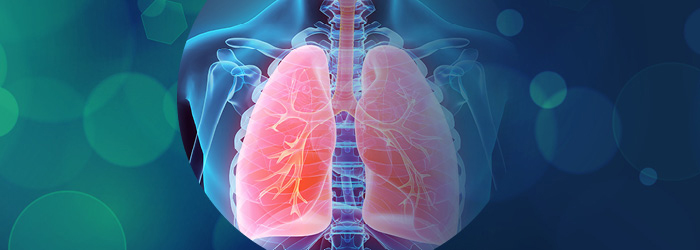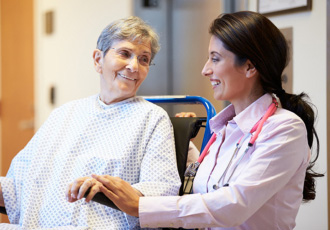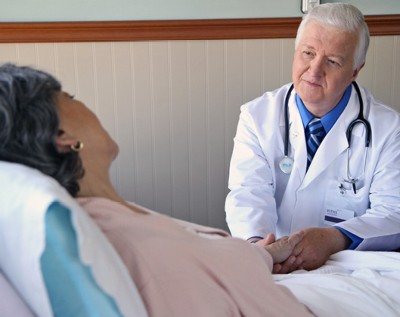What Does VITAS Do for Patients and Families Coping with Advanced Lung Disease?

Your patient with advanced lung disease is on multiple medications, prone to exacerbations, in and out of the hospital. Family caregivers are stressed, the patient needs increasing assistance with activities of daily living. The family calls your office, 9-1-1, and the hospital.
VITAS can help. We have the resources to keep your high-risk, hospice-eligible ALD patient at home and comfortable during a crisis, day or night, and relieve the cost burden to the patient and their insurer. Let’s talk about the VITAS services that can make a difference.
What Does VITAS Offer?
Medications
- Proactive clinical approach that enhances quality of life and symptom management
- Related medications are covered at no additional cost
- Collaborate with PCP and/or pulmonologist on plan of care
- Medications*: corticosteroids, mucolytics, antitussives, bronchodilators and other related medications
- Antibiotics
- IV fluids*/hyperdermaclysis*/other program-specific treatment modalities*
- Home-based education regarding medication administration to maximize efficient delivery bronchodilators
- Intensive management of dyspnea, anxiety and other symptoms
*Requires clinical case discussion between the VITAS medical director and attending physician.
HME/supplies
- Provide necessary equipment for patient safety, quality of life and caregiver support
- Financial burden of high costs is relieved
- Nebulizers
- BiPap, CPAP or other non-invasive ventilation
- Oxygen, including high-flow
- Wheelchair, shower chair, bedside commode—to help with energy conservation
- Hospital bed, over-bed table
- Mattress variations to reduce skin breakdown (including low-air-loss mattress)
- Hoyer lift for safety of transfers, energy conservation & caregiver assistance
- Diapers, barrier creams, gloves, wound care supplies
High-acuity levels of care
- Telecare®: 365/7 and weekends. Live clinicians, triage, after-hours and emergency calls
- Licensed clinicians have real-time access to the patient EMR to best support patient/family/facility through a respiratory crisis. If needed, the clinician will also dispatch a nurse to patient home.
- After-hours clinicians: Designated nurses who respond to after-hours and emergency calls.
- Intensive Comfort Care® (continuous care): When a change in condition or acute respiratory exacerbation requires intensive symptom management, VITAS is able to provide, on a temporary basis in the home, a licensed nurse and/or HHA at the patient’s bedside per Medicare guidelines.
- General Inpatient Care: Intensive symptom management on a temporary basis when acute respiratory exacerbation or change in symptoms cannot be managed at home.
Complex modalities
- Oxygen: Back-up O2 tanks for emergency power outages, high-flow and liquid oxygen with option for Venturi & non-rebreather mask
- Ventilator removal support
- Tracheostomy (non-ventilator-dependent)
- BiPAP, CPAP or other non-invasive ventilation
- Thoracentesis*
- Pleurex drains
- Respiratory therapist*
- Dietician support
- Therapy services*: PT, OT, speech
Only if appropriate and approved by VITAS medical director. May be program-specific. Check with your program.
Care team
- VITAS national average is 5.5 visits per week
- Hospice Aide: Based on individualized plan of care: bathing, dressing, feeding, etc.
- Nurse: Symptom management, medication review, disease-specific education
- Physician: Collaborative support with PCP/pulmonologist
- Volunteer: Life review, friendship, reading books, QOL activities
- Respite care: For caregiver burnout/relief up to five days
- Chaplain: Non-denominational support, discussions providing closure
- Social Worker: Family meetings, counseling, facilitating reunions, access to community resources, help with emotional suppression
- Respiratory Therapist: Pulmonary hygiene, teaching, support
- Alternative Therapy: Massage, music, pet*
- WINKs “What I Need to Know”: Patient/family educational resources that energy conservations techniques, meditation, depression, anxiety, oxygen safety, advance care planning

Check Hospice Guidelines
Get diagnosis-specific guidelines in our hospice eligibility reference guide.
Hospice Guidelines by Diagnosis Refer Your Patient